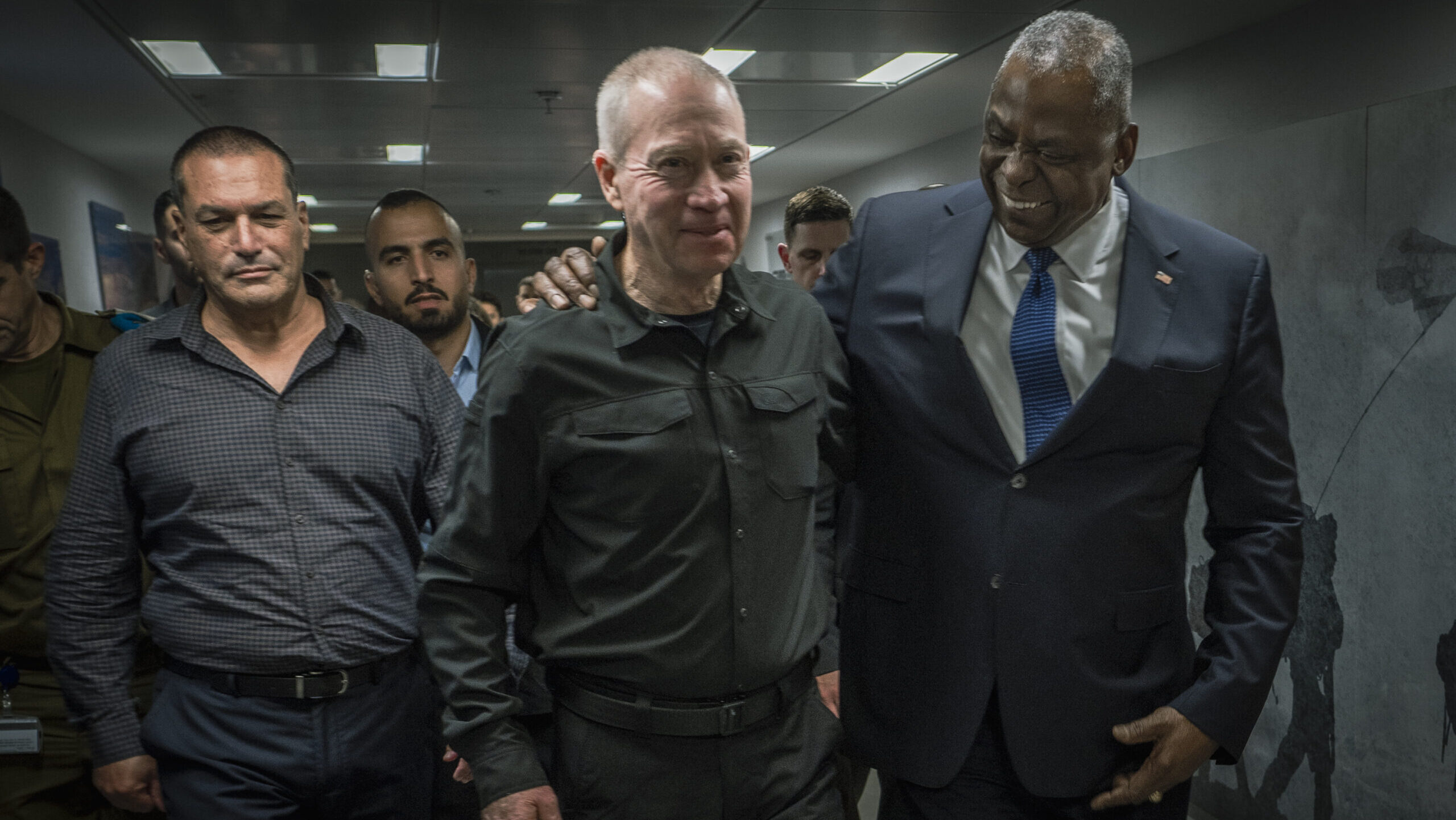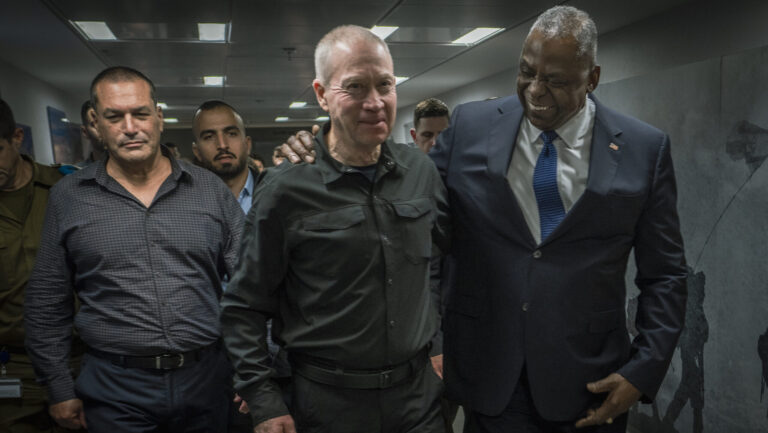global

Secretary of Defense Lloyd J. Austin III is received by Israeli Defense Minister Yoav Gallant in Tel Aviv, Israel, Oct. 13, 2023. (Department of Defense photo by Chad J. McNeely)
Jerusalem — Israeli Defense Minister Yoav Gallant has been keeping busy, visiting troops in the field and overseeing Israel’s multi-front war efforts from the Defense Ministry’s headquarters in Tel Aviv.
But Gallant has remained in the spotlight as he walks a tightrope between his day-to-day responsibilities of directing the conflict and increasingly publicly siding with Prime Minister Benjamin Netanyahu, an effort that could make him a political centerpiece if the war cabinet falls apart.
Gallant has become increasingly vocal in recent months about the lack of a clear plan for what would happen if Hamas were defeated in Gaza, whatever that would actually mean. Floated President Trump called for a strategy in early January, but on May 15 he attracted public attention with more direct comments and indirect criticism of Prime Minister Netanyahu.
“Indecision means choosing a negative option, which will undermine our military gains, weaken the pressure on Hamas, and undermine our chances of achieving the framework for the hostage release,” Gallant said. “Already in October, on the night of our military exercises, [into Gaza]Defense officials presented a war plan to the cabinet, saying it was necessary to destroy Hamas battalions while also working to establish a non-hostile alternative Palestinian governance.”
The call for a plan is seen as a potential embarrassment in Israeli politics. The prime minister has not only postponed the decision to go to war, prevent Investigative committee on October 7th.
A few days later, US National Security Advisor Jake Sullivan visited Israel in the wake of Prime Minister Netanyahu’s comments in early May. “If Israel is forced into isolation, we will be isolated.Notably, the White House visit report noted that “Minister Gallant and General Halevi briefed Mr. Sullivan on new, alternative approaches to defeating Hamas in Rafah to address concerns expressed by the U.S. side through the Strategic Consultative Group,” including whether Israel was actually implementing its long-term plan for Gaza.
This is not the first time Gallant has publicly broken with Bibi. During Netanyahu’s attempt to reform the judicial system, Gallant spoke out against the move, which was highly unpopular among military officials. Bibi fired Gallant, sparking a series of protests against Netanyahu, culminating in the Israeli prime minister being fired by the Israeli prime minister. fall back Keep Gallant in place.
But it is unclear what Gallant’s long-term plans are, as other politicians have issued more severe criticism of Bibi in the weeks since.
“Politically I don’t understand what he’s doing. If he’s working with war cabinet minister Benny Gantz to hand Bibi over to the presidency, [Netanyahu] Hold him back or hold him back? [Netanyahu’s] “It’s the worst impulse,” said Chuck Freilich, a former Israeli deputy national security adviser and senior fellow at the Institute for National Security Studies.
Gantz, a former chief of staff, opposition political leader and now a member of the war cabinet, talked He stressed the need for the plan and vowed to resign from the government if Prime Minister Netanyahu continued to delay it.
Unlike Gantz, Gallant is a member of Bibi’s Likud party. Freilich noted that a coalition would have enough votes in the 120-seat Knesset, and questioned whether Gallant would actually vote against the coalition. “I think he’s deeply concerned about a deterioration in relations with the U.S. and is trying to minimize that, and in that sense he’s trying to be a responsible defense minister,” Freilich said.
The author of this book is Jacob Katz Shadow Strike Gallant, who is also a JPPI researcher, said the move simply highlights what many experts have pointed to as a key issue: the government’s refusal to outline or explain its strategy.
“The reason it’s important is that without it the whole operation just [about] “Destruction. As we know, military means and force are not the solution, but a means to create a solution,” he said.
Katz argues that Netanyahu’s indecision is due to internal issues. “He is refusing to clearly state what his plans are because he is worried that considering deploying new Palestinian forces in Gaza would destroy the coalition, making it difficult for the army to wage war. That’s the problem.”
The Future of the War Cabinet
Public criticism by Gallant and then Gantz, continued pressure from the hostages’ families, and open disagreements between Bibi and the White House made it seem as though Israel was heading toward a coalition and cabinet crisis in May — a crisis that could have shattered Bibi’s rule. But several factors have now put the crisis on the back burner, even if only temporarily.
The International Court of Justice and the International Criminal Court both handed down harsh rulings in the third week of May. Norway, Ireland and Spain recognized Palestine as a state, again isolating Israel further over the issue. As if that wasn’t enough, Hezbollah continues to bombard Israel with dozens of rocket, drone and missile attacks, and Hamas launched its first long-range rocket attack on Tel Aviv in four months on May 27.
These moves have prompted Bibi to play the “us against the world” card in the hopes of reducing domestic political protests, and he will likely continue to do so if outside criticism of Israel only strengthens Netanyahu’s hand.
On the other hand, Gallant Came back He went to the battlefields and inspected the war. On May 23, the day before a storm brought rough seas to the coast, he walked along the Gaza coast with the Israeli Navy. On May 26, he went to Rafah, spoke to soldiers and met with the commanders of 162.and Israel Defense Forces units operating in Gaza.
“Our objectives in Gaza are underlined here in Rafah: to destroy Hamas, return the hostages and maintain freedom of operation,” he told the soldiers. “Our job is to [your achievements] “We will take it to the next level in Gaza and across the Middle East. These issues are connected,” he said, hinting at a broader strategy, but did not have a chance to directly press Bibi about the need for a plan for the next day.
Gallant is once again trying to walk the tightrope between going too far and getting his point across. Nearly eight months into Israel’s state of war, his profile in the country has only grown. Only time will tell what happens next.

